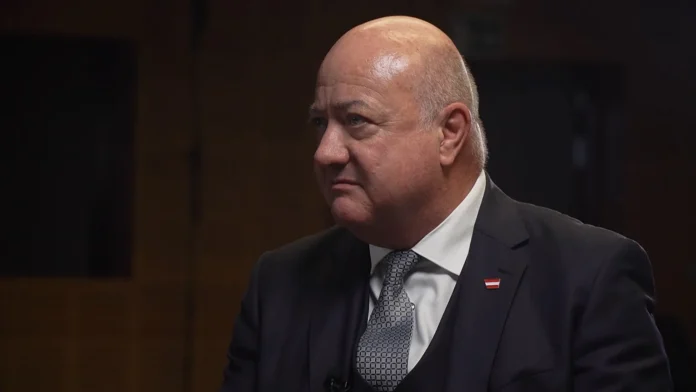
|
Getting your Trinity Audio player ready...
|
Austria’s government has stepped firmly into the escalating debate over Israel’s place in next year’s Eurovision Song Contest, warning that Vienna may not host the event if the country is excluded.
Chancellor Christian Stocker (pictured above) has repeatedly voiced his support for Israel’s participation. Speaking to credible Austrian news outlet Kleine Zeitung, Stocker said it would be “unimaginable” for Austria to prevent Israel competing in Vienna. His comments were echoed by senior figures in the governing ÖVP, with State Secretary Alexander Pröll insisting that “it’s impossible that precisely we should forbid a Jewish artist from coming to Vienna”.
The Austrian daily oe24 reported that Stocker and Pröll are pressuring ORF and the city of Vienna not to host Eurovision if the EBU votes in November to exclude Israel. Withdrawing as host could leave Austria facing a penalty of up to €40 million, though no official statement from ORF has suggested that such a step is imminent.
ORF director general Roland Weißmann has publicly backed Israel’s continued participation, a position endorsed by the broadcaster’s foundation council. Foreign minister Beate Meinl-Reisinger has also weighed in, describing exclusion as “counterproductive” and writing to at least six European governments urging them not to pursue boycotts.
The Austrian government’s stance has been confirmed by multiple outlets across the region. Germany’s public broadcaster NDR reported in September that “host country Austria welcomes Israeli participation”, quoting Weißmann as saying he would “very much welcome and wish for” Israel to take part in Vienna. The Süddeutsche Zeitung has also covered the debate, underlining that Austria is standing apart from broadcasters in countries such as Spain, the Netherlands and Ireland that have threatened withdrawal if Israel remains.
International agencies have reinforced the picture. Reuters reported on Meinl-Reisinger’s diplomatic outreach, while Sky News highlighted the political pressure mounting on the host nation.
The controversy follows the EBU’s decision to call an extraordinary general assembly in November to decide Israel’s fate. The vote requires an absolute majority of the 68 full member broadcasters, and lobbying has intensified on both sides.
For Austria, the issue is especially sensitive. Vienna’s role as host city is underlined by both symbolic and practical weight: the contest is scheduled for the Wiener Stadthalle in May, with semi-finals on the 12th and 14th and the grand final on the 16th. Officials fear that the exclusion of Israel could be seen as an affront given Austria’s history, with some ÖVP figures framing the question as one of cultural and moral responsibility.
At the same time, the crisis exposes a tension between politics and public broadcasting. While the Austrian government has signalled strong opposition to any ban, ORF has so far stopped short of threatening to withdraw from hosting. The ultimate decision rests with the EBU membership, leaving Austria in the awkward position of both preparing to stage the contest and preparing for the possibility that it may not do so at all.





